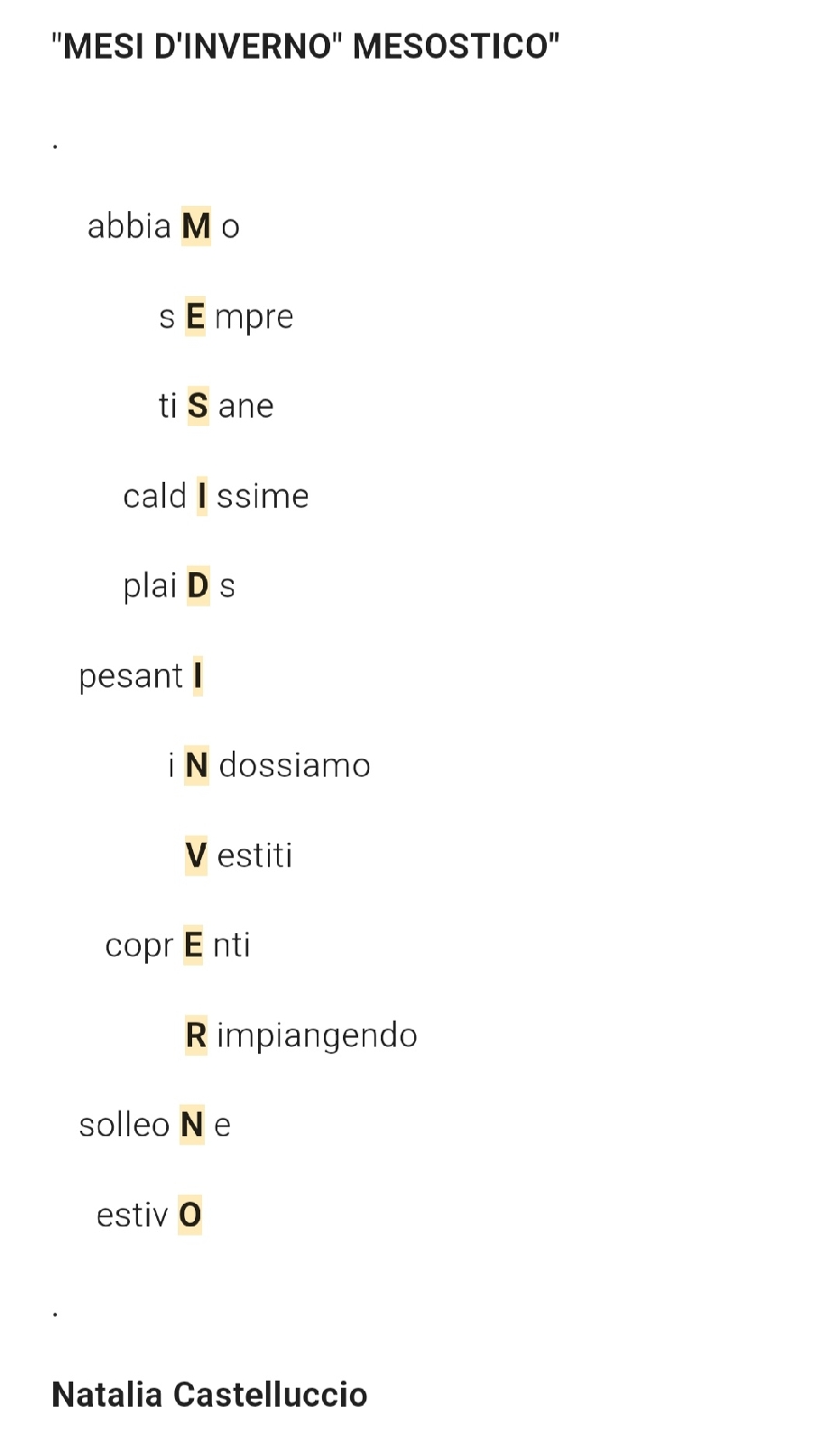.
PREFAZIONE LIBRO: "Lascio che la vita faccia da sé..." DI BRUNO NAVONI
.
Sono vari i modi di leggere le poesie? Vero. Il più importante dovrebbe essere quello letterario, che risponde alla semplice domanda: c’è bellezza letteraria in quel che scrive un autore? Se la risposta è positiva poi si entra nelle questioni tematiche o in quelle dei gusti di chi legge, e in questa prefazione diremo anche di questo.
Il modo in cui scrive Natalia Castelluccio, il suo modo di trattare il cuore, i sentimenti, la realtà quotidiana, gli eccessi e le cadute della vita, hanno qualcosa che richiama però un’altra disciplina. Va oltre la letteratura (che rimane la sua forma espressiva), ma c’è anche da rilevare una cifra stilistica di tipo antropologico. E allora come potremmo avvicinare le poesie della Castelluccio? Unendo antropologia e letteratura. Un modo per porre domande sui bisogni della Specie e una visione sentimentale delle parole da usare.
Quando leggo le sue poesie, penso a un’antropologa dei sentimenti. Qualcosa che ha a che fare col primitivo o in un certo senso selvaggio. Attenzione, come ha fatto notare Levy-Strauss, il pensiero selvaggio non è il pensiero dei selvaggi (cioè, in modo brutale, di chi non dovrebbe essere in grado di pensare e di dare quindi un nome ai vari aspetti del reale)…quel pensiero funziona secondo uno schema diverso, da quello scientifico, anche se è un pensiero ordinato, classificatorio, immediato…e possiamo, uscendo poi dalle riflessioni strutturali dell’antropologia, parlare del pensiero dei sentimenti capace di conoscere e nominare le cose…qualcuno l’ha chiamata intelligenza emotiva…e senza, rischiamo di trovarci nel campo della cecità affettiva…
Appunto l’immediatezza è il concetto da recuperare nelle poesie di Natalia Castelluccio. Trovate le parole per spiegare un’emozione, un sentimento, un desiderio, un piacere, una sofferenza, una perdita, queste cose vengono raccontate con le parole più dirette. Eliot e Montale (il secondo pare abbia preso dal primo) direbbero che è necessario passare prima dal correlativo oggettivo per ‘alzare il livello poetico’…salvo poi doverlo interpretare e spiegare, spiegare perché quella parola e non un’altra…si può far poesia anche senza, se quello che scrivi vi sequestra linguisticamente…un linguaggio che vi crea intorno un mondo fatto di cose…spesso a scuola s’è fatto l’esempio della poesia (Bagni di Lucca) che Montale corregge dopo qualche anno, aggiustandola appunto col correlativo oggettivo…la poesia del 1933 si chiudeva così: “Marmi, rameggi e tu/gioventù a capofitto/nel fossato/Passa l’ultimo uomo nella nebbia/ del suo fiato”…sei anni dopo la corregge così: “Marmi, rameggi/ed uno scrollo giù/foglie a elice, a freccia,/nel fossato/Passa l’ultima greggia nella nebbia/ del suo fiato”…infatti devo dire che io preferisco la prima versione…più cruda e immediata…
…ricordando l’esempio di Montale…Karl Kraus replicherebbe così: “Adoperare parole inusuali è un atto di maleducazione letteraria” …
E tutto questo per arrivare a dire con Umberto Eco: Lector in fabula…in altre parole c’è chi scrive e chi legge…davanti a un testo poetico, il lettore fa riferimento non solo alla propria cultura, ma anche al modo in cui ‘quella’ cultura (quella del lettore) interpreta, racconta e sente la vita…quello che prosaicamente chiamiamo gusto…
Un altro esempio. Prendiamo due righe di una lettera (6 gennaio 1939) di Eric Maria Remarque a Marlene Dietrich… “…penso che oggi già di nuovo ti sono più utile e che forse te ne rallegrerai se porto con me anche questo giorno”…va da sé che Remarque sta pensando alla Dietrich ‘dentro’ quel giorno, come fossero insieme…e ora un pezzo di una poesia che fa così: “Ti porto con me lunedì/ti porto con me martedì/anche mercoledì e venerdì/fino a quando finisce la settimana/ah, ok, e perché giovedì, no?/ma vuoi sempre proprio tutto/a che ora passo giovedì?”…altro che correlativo oggettivo…potrei spacciarla per poesia di Bukowski per un po’ per vedere le reazioni, poi dovrei dire che è un testo mio…Castelluccio tratta tutto con un modo diretto, non alza la vita a poesia, porta la poesia nella vita.
Qualcuno di fronte alla poesia di apertura potrebbe subito farmi notare che è una metafora alta. E quindi pormi la domanda: dov’è ‘la vita in diretta’? ... Vero, ma come possono volare gli angeli che hanno le ali spezzate? Non riusciranno più. Che fare, allora? Guardali lì, ora, ora che hanno preso coscienza: camminano insieme. Hanno sostituito il lirismo del volo celestiale, con la concretezza del tenersi per mano. Funziona così la vita di due cuori. Procedono insieme. Aiutandosi. Ma…ma con la prima poesia siamo già entrati nel quotidiano. E che succede? Di tutto, come s’è già specificato: la paura di non farcela più e il desiderio di ricominciare. Gli sgarbi, le trappole, il male di cui la vita è generosa e che ti fa dire:
Non ho più bisogno neanche di te
Lascio che la vita faccia da sé
…e subito dopo, in Abbracciamoci di nuovo, “Non potrei mai chiuderti il mio cuore/Visto che di te, nel sangue, ne ho il sapore”, ritroviamo la voglia di battersi, perché è dentro di noi quel calore che ci permette di continuare. Un calore o un veleno, dal momento che sottotraccia nella narrazione, e con chiarezza, ancora la Castelluccio, gli anni passano e non ci fanno giustizia, ma possiamo, senza comunque sentirci sconfitti, abbracciarci ancora, perché non abbiamo detto addio, e quindi non ci siamo mai persi completamente, ma lasciamolo dire a lei, lei che porta la poesia nella vita:
Senza un Addio e senza un Ritorno
Abbracciamoci di nuovo…
Tutta la silloge, la seconda di cui mi onoro di fare la presentazione, è costruita sui temi quotidiani: quello della lontananza e del non volersi perdere; tema dell’amore che è croce e delizia, come direbbe Sandro Penna; abbiamo poi l’elogio della donna, della libertà; l’amore come dono (Dopo il tuo amore…/La mia vita/Non avrà bisogno di altro) e il tema dell’erotismo. Qualcosa che squarcia, travolge, e ti carica di piacere senza posa:
Sensi…
Schiavitù di vizi, passioni e diletti
Sensi…
Schiavitù piena di magia e sensata follia
Sensi…
Schiavitù di parole dette in letti disfatti
Sensi…
Schiavitù di una nuova esistenza senza rimpianti
Sensi…
Schiavitù di incontri semplici, casuali e fatali
Sensi…
Schiavitù di cui non posso farne a meno
Sensi…
Schiavitù di un vissuto di cui ne è valsa la pena
Anche questo è un inno alla bellezza. Certo. Ma è un trionfo del corpo sulla vita? Attenzione, è una musica che accompagna: a volte è un rifugio, altre è finalmente gioia a cielo aperto.
C’è disfatta nella vita, e troverete, come in Senza scintille, l’amarezza di dover affermare che Alla fine la nostra bella storia/Resta solo nei ricordi vissuti/E un passato già troppo remoto. Ci può essere dunque disfatta? Nessuno può negarlo, ma, sentite qui:
Matta sono io
Matto sei tu
E se sarò una ventosa sul tuo corpo…
È perché tu già sarai un tatuaggio sul mio
Ricordate l’inizio di angeli con le ali spezzate? Ecco, quegli angeli sono ancora uniti.
A me non rimane che augurarvi buona lettura, con un ultimo suggerimento-guida: Giorgio Cesarano aveva definito l’amore “…come un reciproco sequestro di persona”. Ecco, se qualcuno volesse ‘pesare’ la bontà di quest’altra definizione dell’amore (ce ne sono tantissime), leggendo le poesie di Natalia scoprirebbe quanto c’è di quello che si dovrebbe sapere sulla carnalità emotiva di quel sentimento, e quanto la definizione di Cesarano abbia trovato, in qualche modo, una buona interprete.
.
BOOK PREFACE: "I Let Life Do Itself..." BY BRUNO NAVONI
.
Are there various ways to read poetry? True. The most important should be the literary one, which answers the simple question: is there literary beauty in what an author writes? If the answer is positive, then we enter into thematic questions or those of the tastes of the reader, and in this preface we will also talk about this.
The way Natalia Castelluccio writes, her way of dealing with the heart, feelings, daily reality, the excesses and falls of life, have something that recalls another discipline. It goes beyond literature (which remains its expressive form), but there is also an anthropological stylistic figure to be noted. So how could we approach Castelluccio's poems? By uniting anthropology and literature. A way of asking questions about the needs of the Species and a sentimental vision of the words to use.
When I read her poems, I think of an anthropologist of feelings. Something that has to do with the primitive or in a certain sense wild. Be careful, as Levy-Strauss pointed out, wild thought is not the thought of savages (that is, in a brutal way, of those who should not be able to think and therefore give a name to the various aspects of reality) ... that thought works according to a different scheme, from the scientific one, even if it is an ordered, classificatory, immediate thought ... and we can, then leaving the structural reflections of anthropology, talk about the thought of feelings capable of knowing and naming things ... someone has called it emotional intelligence ... and without it, we risk finding ourselves in the field of affective blindness ...
Precisely immediacy is the concept to recover in the poems of Natalia Castelluccio. Find the words to explain an emotion, a feeling, a desire, a pleasure, a suffering, a loss, these things are told with the most direct words. Eliot and Montale (the second one seems to have taken after the first one) would say that it is necessary to first go through the objective correlative to ‘raise the poetic level’… except then having to interpret and explain it, explain why that word and not another… you can make poetry even without it, if what you write linguistically sequesters you…
a language that creates a world made of things around it… often at school the example of the poem (Bagni di Lucca) that Montale corrects after a few years, adjusting it with the objective correlative… the poem from 1933 ended like this: “Marmi, ramiggi e tu/gioventù a testa di testa/nel digato/Passes the last man in the fog/of his breath”… six years later he corrects it like this: “Marmi, ramiggi/and a shake down/leaves shaped like a helix, like an arrow,/in the ditch/Passes the last flock in the fog/of his breath”… in fact I must say that I prefer the first version… more crude and immediate…
…remembering Montale’s example…Karl Kraus would reply like this: “Using unusual words is an act of literary rudeness” …
And all this to get to say with Umberto Eco: Lector in fabula…in other words there are those who write and those who law…in front of a poetic text, the reader refers not only to his own culture, but also to the way in which ‘that’ culture (that of the reader) interprets, tells and feels life…what we prosaically call taste…
Another example. Let's take two lines from a letter (January 6, 1939) by Eric Maria Remarque to Marlene Dietrich... "... I think that today I am already more useful to you and that perhaps you will be happy if I take this day with me too"... it goes without saying that Remarque is thinking of Dietrich 'inside' that day, as if they were together... and now a piece of a poem that goes like this: "I'll take you with me on Monday/I'll take you with me on Tuesday/Wednesday and Friday too/until the week ends/ah, okay, and why Thursday, right?/but do you always want everything/what time am I spending Thursday?"... more than an objective correlative... I could pass it off as a poem by Bukowski for a while to see the reactions, then I would have to say that it is my text... Castelluccio deals with everything directly, he doesn't elevate life to poetry, he brings poetry into life. Someone faced with the opening poem could immediately point out to me that it is a lofty metaphor. And then I ask myself: where is ‘living life’? ... True, but how can angels fly with broken wings? They will no longer be able to do so. What to do, then? Look at them there, now, now that they have become aware: they walk together. They have replaced the lyricism of celestial flight with the concreteness of holding hands. This is how the life of two hearts works. They proceed together. Helping each other. But… but with the first poem we have already entered everyday life. And what happens?Of everything, as already specified: the fear of not being able to do it anymore and the desire to start again. The insults, the traps, the evil that life is generous with and that makes you say:
I don't even need you anymore
I'll let life do its thing
...and immediately after, in Abbracciamoci di nuovo, "Non posso mai chiusi il mio cuore/Visto che di te, nel sangue, ne ho il gusto", we find the desire to fight again, because it is within us that warmth that allows us to continue. A warmth or a poison, since under the surface of the narration, and with clarity, Castelluccio again, the years pass and do not do us justice, but we can, without feeling defeated, embrace each other again, because we have not said goodbye, and therefore we have never completely lost each other, but let's leave it to her to say it, she who brings poetry into life:
Without a Goodbye and without a Return
Let's embrace each other again...
The entire anthology, the second of which I am honored to present, is built on everyday themes: that of distance and of not wanting to lose each other; the theme of love that is a cross and a delight, as Sandro Penna would say; then we have the praise of women, of freedom; love as a gift (After your love.../My life/Will not need anything else) and the theme of eroticism. Something that tears, overwhelms, and loads you with pleasure without rest:
Senses…
Slavery of vices, passions and delights
Sens…
Slavery full of magic and sensible madness
Sens…
Slavery of words spoken in unmade beds
Sens…
Slavery of a new existence without regrets
Sens…
Slavery of simple, casual and fatal encounters
Sens…
Slavery I cannot do without
Sens…
Slavery of an experience that was worth it
This too is a hymn to beauty. Of course. But is it a triumph of the body over life? Be careful, it is a music that accompanies: sometimes it is a refuge, other times it is finally open-air joy.
There is defeat in life, and you will find, as in Senza sparkille, the bitterness of having to affirm that In the end our beautiful story/Remains only in the memories lived/And a past already too remote. Can there therefore be defeat? No one can deny it, but, listen to this:
I am crazy
You are crazy
And if I will be a suction cup on your body…
It is because you will already be a tattoo on mine
Remember the beginning of angels with broken wings? Here, those angels are still united.
All that remains for me to do is wish you a good read, with one last suggestion-guide: Giorgio Cesarano had defined love "... as a mutual kidnapping". Here, if someone wanted to 'weigh' the goodness of this other definition of love (there are so many),reading Natalia's poems, he would discover how much there is of what should be known about the emotional carnality of that feeling, and how Cesarano's definition has found, in some way, a good interpreter.
.
PRÉFACE DU LIVRE : « Je laisse la vie faire son œuvre... » PAR BRUNO NAVONI
.
Existe-t-il différentes manières de lire des poèmes ? Réel. Le plus important devrait être le côté littéraire, qui répond à la question simple : y a-t-il une beauté littéraire dans ce qu’écrit un auteur ? Si la réponse est oui, alors nous entrons dans des questions thématiques ou celles des goûts du lecteur, et dans cette préface nous en parlerons également.
La façon dont Natalia Castelluccio écrit, sa façon d’aborder le cœur, les sentiments, la réalité quotidienne, les excès et les chutes de la vie, a quelque chose qui rappelle une autre discipline. Cela va au-delà de la littérature (qui reste sa forme expressive), mais il y a aussi une particularité stylistique anthropologique à noter. Alors comment pourrions-nous aborder les poèmes de Castelluccio ? Combiner anthropologie et littérature. Une façon de poser des questions sur les besoins de l'Espèce et une vision sentimentale des mots à utiliser.
Quand je lis ses poèmes, je pense à une anthropologue des sentiments. Quelque chose qui a à voir avec le primitif ou, dans un certain sens, le sauvage. Attention, comme l’a souligné Lévy-Strauss, la pensée sauvage n’est pas la pensée des sauvages (c’est-à-dire, de manière brutale, de ceux qui ne devraient pas pouvoir penser et donc donner un nom aux différents aspects de la réalité)… que la pensée fonctionne selon un schéma différent, du schéma scientifique, même s’il s’agit d’une pensée ordonnée, classificatoire, immédiate… et nous pouvons alors, en sortant des réflexions structurelles de l’anthropologie, parler de la pensée des sentiments capables de connaître et de nommer les choses… quelqu’un l’a appelée intelligence émotionnelle… et sans elle, nous risquons de nous retrouver dans le champ de la cécité affective…
L’immédiateté est précisément le concept à retrouver dans les poèmes de Natalia Castelluccio. Trouvez les mots pour expliquer une émotion, un sentiment, un désir, un plaisir, une souffrance, une perte, ces choses sont dites avec les mots les plus directs. Eliot et Montale (le deuxième semble avoir pris le relais du premier) diraient qu’il faut d’abord passer par le corrélatif objectif pour « élever le niveau poétique »… sauf qu’il faut ensuite l’interpréter et l’expliquer, expliquer pourquoi ce mot-là et pas un autre… on peut faire de la poésie même sans, si ce que l’on écrit nous séquestre linguistiquement…
un langage qui crée un monde fait de choses qui vous entourent… souvent à l’école on donnait l’exemple du poème (Bagni di Lucca) que Montale corrigea après quelques années, en l’ajustant avec le corrélatif objectif… le poème de 1933 se terminait ainsi : « Marmi, ramiggi e tu/gioventù a testafino/nel dittato/Passes the last man in the fog/of his breath »… six ans plus tard il le corrigea ainsi : « Marmi, ramiggi/and a shake down/leaves shaped like a spiral, like an arrow,/in the ditch/Pass the last flock in the fog/of his breath »… en fait je dois dire que je préfère la première version… plus brute et immédiate…
…se rappelant l’exemple de Montale…Karl Kraus répondrait ainsi : « Utiliser des mots inhabituels est un acte de grossièreté littéraire »…
Et tout cela pour arriver à dire avec Umberto Eco : Lector in fabula… autrement dit il y a quelqu’un qui écrit et quelqu’un qui lit… devant un texte poétique, le lecteur se réfère non seulement à sa propre culture, mais aussi à la manière dont « cette » culture (celle du lecteur) interprète, raconte et ressent la vie… ce que nous appelons prosaïquement le goût…
Un autre exemple. Prenons deux lignes d'une lettre (6 janvier 1939) d'Eric Maria Remarque à Marlene Dietrich... "... Je pense qu'aujourd'hui je te suis déjà plus utile et que peut-être tu seras heureuse si j'emporte aussi cette journée avec moi"... il va sans dire que Remarque pense à Dietrich 'à l'intérieur' ce jour-là, comme s'ils étaient ensemble... et maintenant un morceau d'un poème qui dit ceci : "Je t'emmènerai avec moi lundi/Je t'emmènerai avec moi mardi/Mercredi et vendredi aussi/jusqu'à la fin de la semaine/ah, d'accord, et pourquoi jeudi, non ?/mais tu veux toujours tout/Quel temps est-ce que je passe jeudi ?"... plus qu'un corrélatif objectif... Je pourrais le faire passer pour un poème de Bukowski pendant un moment pour voir les réactions, alors je devrais dire que c'est mon texte... Castelluccio traite de tout de manière directe, il n'élève pas la vie à la poésie, il fait entrer la poésie dans la vie. Quelqu’un, confronté au poème d’ouverture, pourrait immédiatement me faire remarquer qu’il s’agit d’une métaphore élevée. Et puis je me demande : où est « vivre la vie » ? ...C'est vrai, mais comment les anges peuvent-ils voler avec des ailes brisées ? Ils ne pourront plus le faire. Que faire alors ? Regardez-les là, maintenant, maintenant qu’ils ont pris conscience : ils marchent ensemble. Ils ont remplacé le lyrisme du vol céleste par le concret de se tenir la main. Voilà comment fonctionne la vie de deux cœurs. Ils procèdent ensemble. S'entraider. Mais… mais avec le premier poème, nous sommes déjà entrés dans la vie quotidienne. Et que se passe-t-il ?De tout, comme déjà précisé : la peur de ne plus pouvoir supporter et l'envie de recommencer. Les insultes, les pièges, le mal dont la vie est généreuse et qui vous fait dire :
Je n'ai même plus besoin de toi
Je laisse la vie prendre soin d'elle-même
…et immédiatement après, dans Abbracciamoci di nuovo, « Non posso mai chiusi il mio cuore/Visto che di te, nel sangue, ne ho il sapori », nous retrouvons l’envie de lutter, car c’est en nous cette chaleur qui nous permet de continuer. Une chaleur ou un poison, car sous la surface du récit, et avec clarté, toujours Castelluccio, les années passent et ne nous rendent pas justice, mais nous pouvons, sans nous sentir vaincus, nous embrasser à nouveau, car nous ne nous sommes pas dit au revoir, et donc nous ne nous sommes jamais complètement perdus, mais laissons-la le dire, elle qui donne vie à la poésie :
Sans au revoir et sans retour
Serrons-nous à nouveau dans nos bras…
L'ensemble de la collection, la deuxième que j'ai l'honneur de présenter, est construit sur des thèmes du quotidien : celui de la distance et de ne pas vouloir se perdre ; thème de l'amour qui est à la fois une bénédiction et une malédiction, comme dirait Sandro Penna ; puis nous avons l’éloge des femmes, de la liberté ; l'amour comme cadeau (Après ton amour…/Ma vie/N'aura besoin de rien d'autre) et le thème de l'érotisme. Quelque chose qui vous déchire, vous submerge et vous remplit de plaisir sans interruption :
Les sens…
L'esclavage des vices, des passions et des plaisirs
Les sens…
L'esclavage plein de magie et de folie sensée
Les sens…
L'esclavage des mots prononcés dans des lits défaits
Les sens…
L'esclavage d'une nouvelle existence sans regrets
Les sens…
L'esclavage des rencontres simples, fortuites et fatales
Les sens…
L'esclavage sans lequel je ne peux pas vivre
Les sens…
L'esclavage d'une vie qui en valait la peine
C'est aussi un hymne à la beauté. Certain. Mais est-ce un triomphe du corps sur la vie ? Attention, c'est la musique qui accompagne : parfois c'est un refuge, d'autres fois c'est enfin la joie à ciel ouvert.
Il y a des défaites dans la vie, et vous trouverez, comme dans Senza sparkille, l'amertume de devoir affirmer qu'à la fin notre belle histoire/Ne reste que dans les souvenirs vécus/Et un passé déjà trop lointain. Peut-il y avoir une défaite alors ? Personne ne peut le nier, mais écoutez ceci :
je suis fou
Tu es fou
Et si j'ai un faible pour ton corps...
C'est parce que tu seras déjà un tatouage sur le mien
Vous vous souvenez du début d'Anges aux ailes brisées ? Voici que ces anges sont toujours unis.
Il ne me reste plus qu’à vous souhaiter une bonne lecture, avec un dernier conseil : Giorgio Cesarano avait défini l’amour comme « …un enlèvement mutuel ». Ici, si quelqu'un voulait « peser » la bonté de cette autre définition de l'amour (il y en a beaucoup),En lisant les poèmes de Natalia, il découvrirait combien il y a de choses à savoir sur la charnalité émotionnelle de ce sentiment, et comment la définition de Cesarano a trouvé, d'une certaine manière, un bon interprète.






















